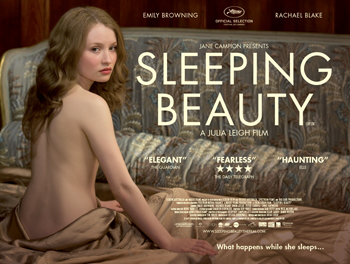Sleeping Beauty ***
 On face value, Australian author Julia Leigh’s Sleeping Beauty is both a sordid and brave film-making debut that will literally divide opinion. It’s not the nudity that is the main issue for most, rather the treatment of the main character, Lucy, played by Sucker Punch’s Emily Browning that triggers deep feelings of revulsion. At the same time, nothing is ever black and white, and there is a tragic fragility to all the characters’ mental states in this that counterbalances the horror first experienced.
On face value, Australian author Julia Leigh’s Sleeping Beauty is both a sordid and brave film-making debut that will literally divide opinion. It’s not the nudity that is the main issue for most, rather the treatment of the main character, Lucy, played by Sucker Punch’s Emily Browning that triggers deep feelings of revulsion. At the same time, nothing is ever black and white, and there is a tragic fragility to all the characters’ mental states in this that counterbalances the horror first experienced.
Lucy (Browning) is a young university student drawn into a mysterious hidden world of unspoken desires that requires her absolute submission. She becomes a Sleeping Beauty, a girl drugged to spend the night with old men who covet her youth and beauty. However, Lucy begins to question what happens to her while she is asleep, and it is this hunger to know that awakens her from her daily slumber after a tragic event.
Browning’s incredibly bold performance cannot be faulted in this story. Her natural innocence and flawless radiance makes her an ideal casting for such a role – much like her Baby Doll presence in Sucker Punch. However, she keeps Lucy very real and intriguingly reckless in her ‘awake’ moments, as we watch a woman searching for her profound mark and social acceptance, being passively aggressive in trying to achieve that. Lucy is a user as much as she is used, forever thinking about the financial gain in her various encounters. It all comes back to your own view of those in the adult entertainment – exploited or empowered? You decide, hence the divided opinion.
That is not to say Leigh’s film does set out to outrageously disturb, especially with Man 2 scenes in the Sleeping Beauty Chamber. These depict the extreme position of Lucy’s trance-like subordination. They also act as the catalyst to her awakening from the ‘poison’ – like in the fairy tale. Leigh keeps the camera wide, implicating us in events as we watch like fascinated voyeurs. This makes viewing even more unsettling and guilt-ridden at times. But the most affecting aspect is Man 1 and his calmly delivered monologue addressed direct to us, the camera, that in hindsight, is the haunting aspect of the film, because it’s a situation perpetuated by societal norms that frown upon the exposure of the older figure. This injects a sense of huge melancholy into proceedings as ingrained biases are questioned.
Leigh’s work first incites extreme views then raises urgent questions that cannot be ignored about the dark depths of the human psyche. Sleeping Beauty will arouse interest, purely because of its supposed tabooed subject matter and the promise for Browning fans of seeing their heroine in all her natural glory. As the director said, it’s hard to establish an objective review of what you witness in Sleeping Beauty because it is purely down to one’s own conditioning. If that sounds like a cop-out, it isn’t meant to be. One thing is for certain this feature is what is loosely known as ‘challenging cinema’.
3/5 stars
By @FilmGazer